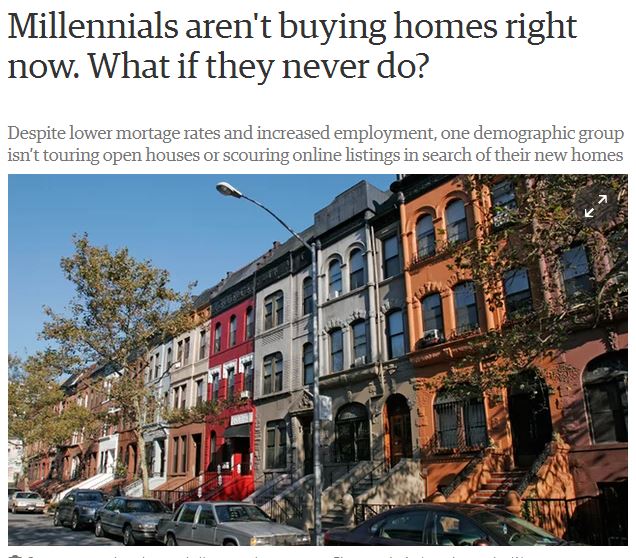… there’s one demographic group that, notably, isn’t touring open houses or scouring online listings in search of their new homes. No prizes for guessing which one.
Yes, far from buying new homes, millennials increasingly aren’t even renting. The proportion of this demographic – aged around 18 to 35 – who end up living with their parents has been on the rise steadily since the Great Recession, peaking at about 36%, according to the Pew Research Center.
Now, for the first time in 130 years, living with your parents has become the most common living arrangement for young men and women aged 18 to 34, Pew reported this week. …
Even if they didn’t have student loans to deal with, the affordability problem remains. In those markets where prices have soared, making buying a home problematic even for millennials’ older and more solvent peers, buying even a closet is simply out of the question. Apartment List, an online rental marketplace, ran some numbers and calculated that it would take an average of a decade for millennials to come up with the required 20% down payment to buy a home in the dozen or so most in-demand urban locales. …
It’s no surprise that the cities with the biggest affordability problem have been those to see the biggest boom in “adult dorms”, or “co-living” projects, in which residents have their own small rooms (sometimes shared) and then large, common spaces, such as kitchens and living rooms. Think of a cooler, millennial version of Friends. …
And what if – gasp – they decide they actually like their current living arrangements and choose to find a way to remain in them, even when their economic position becomes less strained? This is, after all, the generation turning out in droves to support Sanders, and refusing to accept the political status quo. Why accept the economic status quo?
Before you say, pshaw, it will never happen, stop and think. It already has, about four decades ago, when baby boomers – the last generation of this size – took both the political and the economic status quo, turned it on its head and shook it. The catalyst for what is happening today is quite different – an economic crisis rather than a war – but it’s far from impossible that the combination of political and economic stressors could end up creating radically new rules of the road.














Several generations living together in one home, or in some cases a courtyard ringed with several flats, is not uncommon in other cultures. Perhaps society is changing with the times.
Being of the hippie commune generation, it didn’t take long for me and almost everyone I know to end the experiment because of a the lack of privacy and the rise of big egos, and to break up a set of otherwise good ideals, admittedly sprinkled liberally with naivete. But hey, the music was original!
Many Boomers reverted to the nuclear family and consumerism of their suburban childhoods, and a hefty percentage proceeded even further to molly coddle their kids more than their Depression-era parents would have ever conceived. Not all, mind you, but there is a noticeable sense of unrealisitic entitlement that now permeates Millennial’s expectations for career advancement at a record pace, the absolute necessity of overseas travel and fighting climate change (while ignoring the contradiction), criticizing Boomers because “they have it all” (as if), and now house envy in an outrageous market, especially for the obsolete single-family detached version with a big back yard.
I suppose staying at home ’til 40 gets down to the quality of the relationship with one’s parents. But it’s not as though Millennials don’t have great economic power collectively. Cohousing is an option, as is purchasing a big old timer privately amongst friends and converting it to a fourplex in a non-RS zone with rental suites in the basement for income and room for families to grow in place. Addressing privacy right up front, and having a damned good contract would be essential. Obtaining solid financing commitments among separate parties is too. But this is still one way to make it happen even in today’s spec and supply shortage-driven market.
In the meantime, forget the commune. And growing up won’t be complete until those apron strings have been fully untied.
Wonderful that interest rates are low. That helps those that already have equity at their disposal.
But employment growth doesn’t equal income growth. Without wage growth exceeding cost of living (which includes rapidly increasing rental rates), you can’t build equity. Without equity, no down payment, and without a down payment no ownership.
Housing affordability, both for ownership and the trickle down into the rental market, is one part of the problem.
The relatively flat/declining real (cost-of-living adjusted) wages among those aged 16-34 is another issue (see Chart #5), and it’s been an issue for ~3 decades: http://www.statcan.gc.ca/pub/11f0019m/11f0019m2013347-eng.pdf
+1 … all the ‘affordability’ in the world doesn’t actually make the world affordable, just not as expensive as it might be.